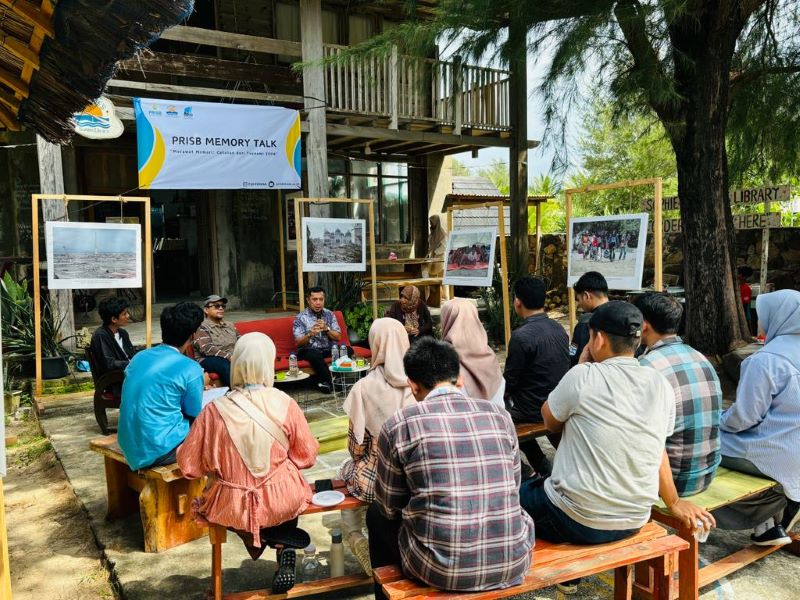
Banda Aceh: On Saturday, December 16, 2023, the Research Center for Social and Cultural Studies (PRISB) at Universitas Syiah Kuala (USK) organized a thought-provoking event titled “Memory Talk: Preserving Memories; Insights from the 2004 Tsunami.” The event took place at Sophie’s Sunset Library in Lhoknga, Aceh Besar.
The program featured three distinguished speakers, each with expertise in the fields of archives, history, and disaster management. The speakers included Alfi Rahman, an academic specializing in disaster management; Muhammad Ihwan, the Head of the Tsunami Archives Office at the National Archives of the Republic of Indonesia (ANRI); and Raihan, a literacy advocate and former national journalist.
Alfi Rahman, also the chairperson of PRISB USK, emphasized that the Memory Talk aimed to commemorate the 2004 Aceh tsunami, not to rekindle trauma but to remember and learn from it. The event was organized in collaboration with BAST-ANRI (Tsunami Archives Office) and Sophie’s Sunset Library.
“We are holding this discussion today not to resurrect the trauma, but to remember it in order to learn valuable lessons from the past, motivate us to lead better lives, and foster gratitude,” stated Alfi.
Muhammad Ihwan, one of the invited speakers, expressed his deep appreciation for the event. He highlighted how such activities can ignite the spirit and motivation of the younger generation to learn about and care for Aceh’s history. During his presentation, Ihwan explained the role of archives in preserving disaster memories. He emphasized that archives are a means to inform the public, and they encompass not only traditional paper documents but also any interpretable form of historical data. In nearly every corner of Aceh, there is a history that can be studied and preserved, and this is the mission of BAST-ANRI.
“Anything that provides information to the public can be considered an archive. If archives used to be in the form of paper and writing, now everything we can interpret is an archive. Almost all destinations in Aceh have their own history that we can study. Our task at BAST-ANRI is to collect as many archives as possible, in any form,” explained Ihwan.
Raihan Lubis, a literacy advocate and Co-Founder of Sophie’s Sunset Library, revealed that many ancient texts had predicted disasters in Aceh, including one known as the “takbir gempa” text. Unfortunately, these texts were categorized as prophecies, leading people to believe they were unlikely to occur.
On the other hand, Alfi Rahman stressed the crucial role of archives in shaping public understanding. For example, the archives related to the tsunami are essential for educating the younger generation. Not everyone perceives the tsunami in the same way, and the role of archives is to provide an accurate understanding of the reality.
Alfi explained that not all individuals have the same perception of the tsunami. Generation Z, born after the tsunami, lacks a comprehensive understanding of the event. They won’t know the magnitude of the tsunami unless they see the massive PLTD Kapal Apung (Floating Power Plant). They won’t understand the extent of the tsunami’s impact unless they visit the tsunami museum and witness the vastness of mass graves.
“In the end, tsunami archives help all of us know, understand, feel, and learn from the past because memories fade over time and seem to be forgotten. Therefore, I encourage young friends to create history archives in more engaging ways so that the younger generation’s enthusiasm for learning will be rekindled, and our historical heritage will be preserved,” concluded Alfi.
The event attracted dozens of participants, including students, academics, and members of the general public.

Recent Comments